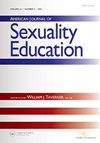Responsiveness of Sex Education to the Needs of LGBTQ + Undergraduate Students and Its Influence on Sexual Violence and Harassment Experiences
IF 1.1
Q2 EDUCATION & EDUCATIONAL RESEARCH
引用次数: 4
Abstract
Abstract Exposure to comprehensive sex education shows promise in preventing sexual violence and sexual harassment (SVSH) perpetration and victimization and supporting survivors. Determining if these benefits are also found in communities experiencing high levels of SVSH, such as lesbian, gay, bisexual, transgender and queer (LGBTQ+) communities, is needed. Utilizing a sequential explanatory mixed-methods study design, we assessed LGBTQ + undergraduates’ exposure to sex education (SE), what SE sources they relied on, and SE’s perceived usefulness and responsivity to LGBTQ + needs. Compared to their non-LGBTQ + peers, LGBTQ + students perceived SE as less helpful in navigating personal desires (t294 = 2.08, p < .05) and sexual consent (t295= 2.15, p < .05). LGBTQ + students were more likely to use media (e.g., internet, pornography) as their primary source of SE on topics such as violence in relationships and consent. In-depth interviews substantiated quantitative findings, highlighting the non-responsiveness of SE among LGBTQ + students and further revealed that having to supplement SE through media increased LGBTQ + students’ vulnerability to SVSH (including online sexual coercion). Via interviews, LGBTQ + students reported formal SE to be non-inclusive, led to experiences of othering, silencing, erasure, and made them more vulnerable to SVSH and related outcomes. SE policy and education must be modified to be more inclusive and helpful for LGBTQ + students, especially relating to SVSH prevention.性教育对LGBTQ +大学生性需求的响应及其对性暴力骚扰经历的影响
摘要接受全面性教育表明,在预防性暴力和性骚扰(SVSH)的实施和受害以及支持幸存者方面有希望。需要确定这些益处是否也存在于SVSH水平较高的社区中,如女同性恋、男同性恋、双性恋、跨性别者和酷儿(LGBTQ+)社区。利用顺序解释混合方法研究设计,我们评估了LGBTQ + 本科生对性教育(SE)的接触,他们所依赖的SE来源,以及SE对LGBTQ的有用性和反应 + 需求。与非LGBTQ相比 + 同龄人,LGBTQ + 学生认为SE在驾驭个人欲望方面帮助较小(t294=2.08,p < .05)和性同意(t295=2.15,p < .05)。LGBTQ + 学生更有可能在关系暴力和同意等话题上使用媒体(如互联网、色情)作为SE的主要来源。深入访谈证实了定量调查结果,强调了LGBTQ中SE的无反应性 + 学生,并进一步透露,必须通过媒体补充SE会增加LGBTQ + 学生对SVSH的脆弱性(包括在线性胁迫)。通过采访,LGBTQ + 学生们报告说,正式的SE是非包容性的,导致了其他人、沉默、擦除的经历,并使他们更容易受到SVSH和相关结果的影响。必须修改SE政策和教育,使其更具包容性,对LGBTQ更有帮助 + 学生,尤其是与SVSH预防有关的学生。
本文章由计算机程序翻译,如有差异,请以英文原文为准。
求助全文
约1分钟内获得全文
求助全文
来源期刊

American Journal of Sexuality Education
EDUCATION & EDUCATIONAL RESEARCH-
CiteScore
2.40
自引率
8.30%
发文量
39
期刊介绍:
The American Journal of Sexuality Education speaks directly to the distinct, professional needs of sexuality educators and trainers. This peer-reviewed journal provides sexuality educators and trainers with current research about sexuality education programming, best practices, sample lesson plans, reports on curriculum development and assessment, literature reviews, scholarly commentary, educational program reports, media reviews (books, videos, internet resources, and curricula), and letters to the editor. The American Journal of Sexuality Education addresses a variety of sexuality topics and audiences, presenting up-to-date theory and practice, lessons, and evaluations.
 求助内容:
求助内容: 应助结果提醒方式:
应助结果提醒方式:


